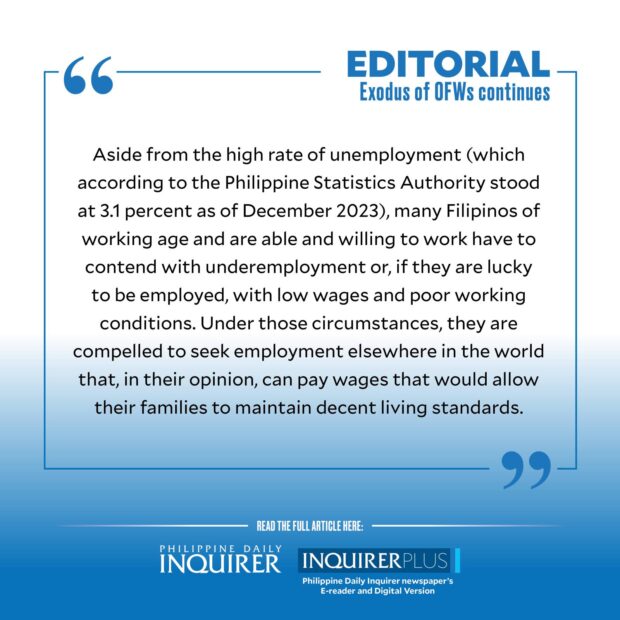Exodus of OFWs continues

The recent announcement of the Department of Migrant Workers (DMW) that several European countries are looking to hire more overseas Filipino workers (OFWs) is illustrative of the unemployment problem in the Philippines.
In a media briefing, DMW Undersecretary Patricia Yvonne Caunan named the Czech Republic, Austria, Hungary, Finland, Denmark, and Portugal as the countries that have expressed interest in hiring more OFWs.
She said there is a high demand for, among others, Filipino health-care workers, caregivers, household workers, housekeepers, workers in tourism-related jobs, and baristas.
According to Caunan, last year, 2,000 OFWs were employed in the Czech Republic, while 6,000 were deployed in Hungary, and that these countries “… were impressed with the performance of our workers, their mentality, and attitude.”
Lack of job opportunities
She also stated that about 10 percent (or $3.8 billion) of the $37 billion that OFWs remitted to the Philippines last year can be attributed to Europe-based OFWs.
The attraction of Filipinos to jobs in foreign countries is attributable to the lack of job opportunities in the Philippines that pay wages that are sufficient to meet the financial needs of ordinary daily life.
What was initially designed as a temporary measure to shore up the country’s low foreign reserves in the late ’70s, the deployment of OFWs to different parts of the world has become an indispensable element of the national economy.
The significance of the OFWs’ remittances is reflected in the way their shortfall or upsurge tends to influence the exchange rate between the Philippine peso and foreign currencies, in particular, the United States dollar.
Badge of honor
But those inflows had come with a heavy social price in terms of dysfunctional families, juvenile delinquency, and drug addiction by young Filipinos who were deprived of parental supervision by the absent father or mother.
When viewed with rose-colored lenses, the demand for OFWs by countries that have not been known before as interested in employing them may be looked at as a “badge of honor.”
It is a recognition of the efficiency and industriousness of Filipino workers that some countries find lacking from their people due to demographic or cultural reasons.
In addition, the proficiency in English of most OFWs gives them an edge over other foreign workers who do not have that skill as it helps hurdle communication problem with the citizens of those countries.
Besides, engaging the services of OFWs who are already proficient in their fields of work saves them from incurring training costs and, most importantly, on wages that are often less than what are paid to their citizen counterpart.
Badge of shame
In the same token, however, the attraction and interest of OFWs in seeking employment in other countries may be described as a “badge of shame” because it shows the inability or failure of the Philippine government to provide sufficient decent jobs to its citizens.
Aside from the high rate of unemployment (which according to the Philippine Statistics Authority stood at 3.1 percent as of December 2023), many Filipinos of working age and are able and willing to work have to contend with underemployment or, if they are lucky to be employed, with low wages and poor working conditions.
Under those circumstances, they are compelled to seek employment elsewhere in the world that, in their opinion, can pay wages that would allow their families to maintain decent living standards.
Coping with the loneliness
In other words, they have no choice. Employment abroad may be the only way they can assure them of a better future.
No doubt, if there are viable employment opportunities in the country, the lure of overseas employment would be minimal, if not out of mind.
Knowing the closeness of the Filipino family, it is not easy to leave the comforts of kith and kin and work in a country whose lifestyle and cultural norms are different.
But the bigger challenge is coping with the loneliness of living in another country and missing the emotional comfort that only family can provide, and this hits hardest for OFWs with children in their formative growth years.
Bittersweet
Thus the reported interest of some European countries to take on more OFWs is bittersweet.
Sweet because it means additional opportunities for Filipinos who are unable to find work in the country that pay decent wages to be employed abroad and receive compensation commensurate to their efforts.
Bitter because they have to leave home and be unsure of what fate awaits them in another country, and for the families they would leave behind, how they would cope with life without them.
Hopefully, the day will come when being an OFW will be a matter of choice and not of compelling need.
















